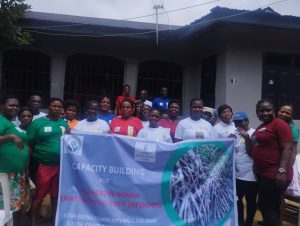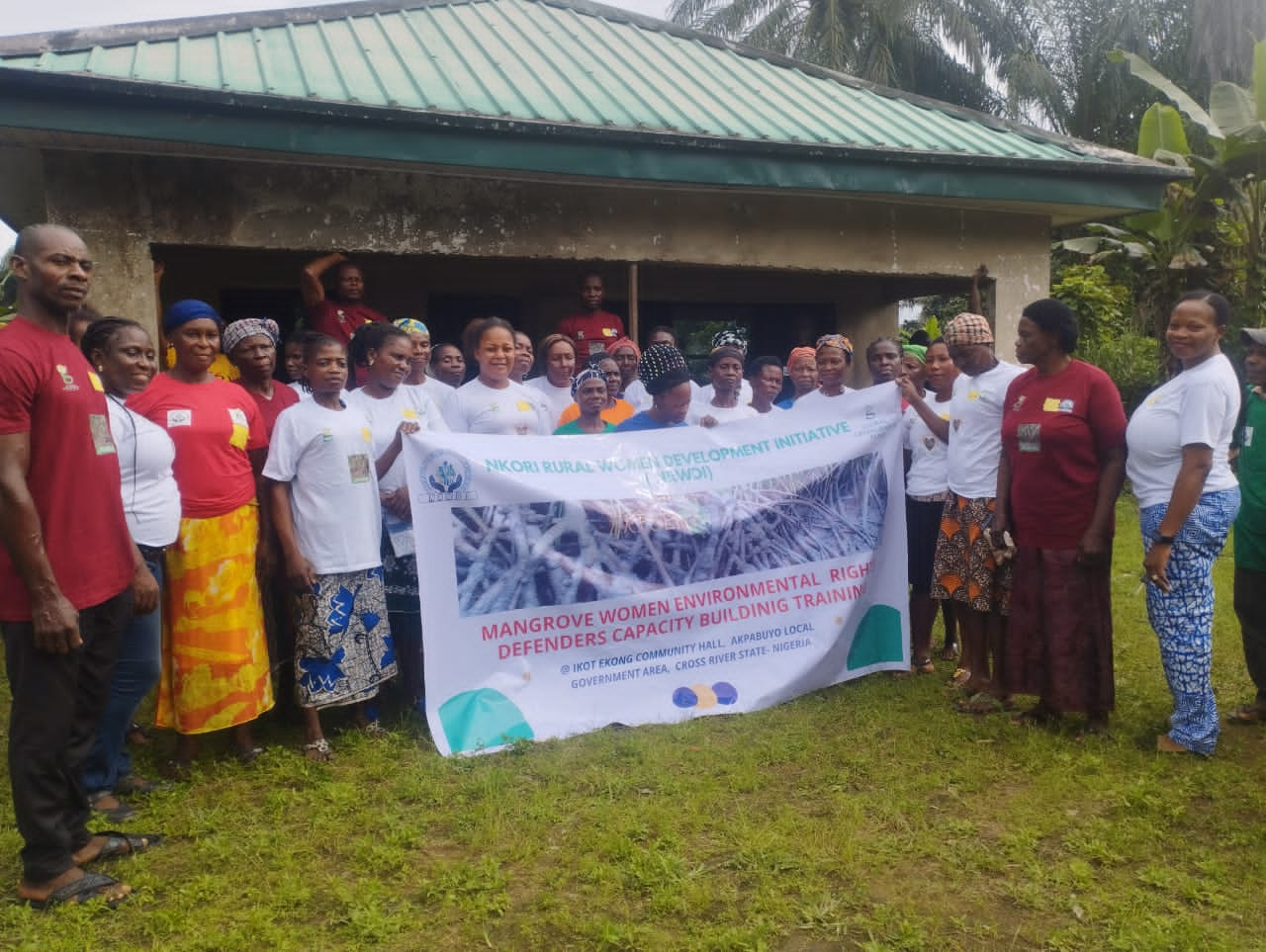Participants from Ikot Ekong community, Akpabuyo LGAi n a group photograph after the training.
By Anietie Akpan
The Nkori Rural Women Development Initiative (NRWDI) has trained 120 women in some coastal communities of Cross River state on climate change impacts and the critical role of mangroves in mitigating these impacts.
The capacity building training programme which was supported by Global Greengrants Fund, held in Ikot Ekong community, Akpabuyo Local Government Area (LGA) with 65 participants on August 27 and Ewa Ekeng community with 55 participants in Calabar South LGA of the state on September 2, 2024.
Environmental experts at the programme acknowledged that the protection and restoration of mangrove ecosystems are critical to the resilience of coastal communities, particularly in the face of escalating climate change impacts. Women in these communities, who often bear the brunt of environmental degradation, have a vital role to play in mangrove conservation efforts hence the need to empower them and strengthen their capacity as defenders of mangroves.
Thus the training programme aimed at enhancing “the awareness and understanding of women in coastal communities regarding climate change impacts and the critical role of mangroves in mitigating these impacts.
“To equip women with the knowledge and skills necessary to engage in effective advocacy and decision-making processes related to environmental conservation.
“Promote the active involvement of women in the regeneration and sustainable management of mangrove ecosystems and foster collaboration between local communities, government agencies, and Non Governmental Organizations (NGOs) in the pursuit of sustainable coastal development”.
In her welcome address at the two communities, the Coordinator of NRWDI, Ms Okoho Ene told the participants that the training programme marks a significant step forward in the collective efforts to protect and restore the precious mangrove ecosystems.
As an organization, she said, “NWRDI is dedicated to women rights and environmental conservation, we are acutely aware of the challenges that our coastal communities face due to climate change, and we are equally aware of the incredible potential that women have to lead the charge in addressing these challenges. Mangroves in the community are more than just trees; they are lifelines for our coastal communities. They provide food, shelter, and livelihoods, and they protect us from the ravages of storms and rising seas. Yet, these vital ecosystems are disappearing at an alarming rate, and with them, the security of our communities”.
In this regards, Ene stated that the training is designed to equip the women with the tools they need to be “effective defenders of our mangroves” as it will provide them with the knowledge to understand the impacts of climate change, the skills to advocate for environmental protection, and the confidence to take on leadership roles in your communities.
She therefore urged the women “to take this opportunity to connect with one another, to share your experiences, and to build a network of strong, empowered women who can drive positive change. Our organization is here to support you every step of the way, and we look forward to seeing the remarkable things you will accomplish.
“Therefore, let us work together to ensure that our mangroves, and our communities, not only survive but thrive”.
In her presentation on “Women’s Involvement in Decision-Making and Advocacy Skill”, Ene focused on enhancing the capacity of women to participate in decision-making processes and advocate for environmental conservation.
Participants were provided with an overview of how environmental policies are formulated and the role of various stakeholders in these processes as the session aimed to demystify governance structures and empower women to engage with policymakers effectively.
On advocacy skills, the session equipped participants with practical skills for advocacy, including how to develop and deliver persuasive messages, build alliances, and use media effectively. Role-playing exercises were used to help participants practice these skills in a supportive environment, highlighting the critical role that women can play in influencing environmental policies and ensuring that their communities’ needs are addressed.
Director, State Min. of Environment, Mr Akpa Agbor, in his presentation said, the Ministry of Environment recognizes the indispensable role that mangroves play in protecting the coastlines, supporting biodiversity, and combating climate change but these ecosystems are “under severe threat, and their degradation puts our communities at great risk.
“We believe that women, who are often the custodians of natural resources in their communities, are key to the success of any conservation effort. This training is not just about imparting knowledge; it is about empowering you to take the lead in safeguarding our environment. You are the pillars of your communities, and your participation in mangrove restoration and environmental advocacy will bring about meaningful change”.

Participants from Ewa Ekeng Community in Calabar South LGA of the state.
According to him, the Ministry of Environment is committed to supporting initiatives that enhance the resilience of our coastal areas. We will continue to work closely with local communities, NGOs, and other stakeholders “to ensure that your voices are heard, your needs are addressed, and your efforts are recognized. I encourage you to take full advantage of this training, to learn, to share, and to emerge as champions of our environment. Together, we can build a sustainable future for our children and for generations to come”.
Another Facilitator at the meetings, Mrs. Ekei Joseph, spoke on, “Women’s Involvement in Mangrove Regeneration and Its Usefulness” stressed on the “Ecological and Socioeconomic Benefits of Mangroves as participants were educated on the various benefits of mangroves, including their role in coastal protection, supporting fisheries, and providing resources for local communities.
“Mangrove Regeneration Techniques: The training included practical demonstrations of mangrove planting techniques, covering everything from site selection to seedling preparation and ongoing maintenance.
“Sustainable Management Practices: Participants learned about sustainable practices that can enhance the long-term health of mangrove ecosystems, such as community-based monitoring and the importance of protecting mature mangroves from deforestation”.
In an interview with Pillar Today, Mrs. Joseph, said, “I came to talk about mangrove conservation and how we can regenerate mangroves in our community, with the help of Nkori Rural Women Development Initiative. I came to tell them what mangrove is and that we should not cut it down because it serves a lot. It helps our fishes because it is a habitat for them, it also prevents flooding from entering the community.
Joseph who works with Green Concern for Development in Calabar, an NGO that deals with environmental issues, equally expressed concern on the rate the mangrove is disappearing, saying “the level they have it cut it down is really bad because they have destroyed the mangrove ecosystem badly, so we trained them to try and conserve the mangrove ecosystem because it serves as a carbon sink to them.
“We do not have enough mangrove here in Cross River, so what we are trying to do is regenerate the mangrove ecosystem. We taught them what mangroves are, the types that are here, and the threats to mangroves which is lipa palm and how it can be eradicated from the mangrove ecosystem”.
She pointed out that that, “Nipa palm is not useful but you find them around the river banks so much, they try to compete with the mangrove forest. So we are telling them that the Nipa palm can be taken off and then they can use that space to regenerate the mangroves.
“They can regenerate the mangroves by getting the seedlings from the river banks, nurse and put it in a black polyethylene bag, add loamy soil, nurse it as if you want to plant palm fruit, and then take it to the wild after some months. They said they have regenerated it before, that there was a time they actually did a nursery site for the mangroves at the river banks and after some time, they transplanted it at the wild”.
Besides, she also appealed to the government of Cross River State to come to help the community people do a regeneration project, especially at the river banks, so that whatever happens, climate changes would not affect us.
During the interactive session, Dorathy Etokren said, “the training has added another important value to my life, I will not stay silence I will be involved to make sure is preserved and protected. Also, I can use regeneration of mangrove as livelihood”.
For Ms Ekanem, “this training has given me a new perspective on the importance of mangroves. I realize that protecting them is not just about preserving fish, but also about safeguarding our livelihoods and the future of our communities.”
A woman community leader, Madam Agatha opined, “empowering women is essential for sustainable development. This training has provided us with the tools and confidence to lead initiatives for mangrove conservation.”
Madam Ikwo Itam: “I learned so much about the threats facing our mangroves and the role we can play in protecting them. I am motivated to raise awareness among my peers and advocate for policy change.
“This training is really an opener because I now realized that without mangrove, there is no sea food”.
